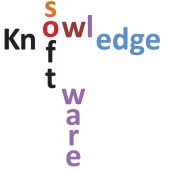Workshop
3rd International Workshop on Software Knowledge -
SKY
2012
4 October, 2012 - Barcelona, Spain
In conjunction with the International Joint Conference on Knowledge Discovery, Knowledge Engineering and Knowledge Management - IC3K 2012
Scope
"Software Knowledge" – in short SKY – means that software in its higher abstraction levels is a new kind of knowledge, Runnable Knowledge.
Thus, the classes and relationships of a software UML diagram are easily viewed as the classes and relationships of a knowledge ontology.
For further details visit SoftwareKnowledge.org
The main theme of the SKY2012 Workshop is Between Software Models and Ontologies.
We mean rigorous and precise transformations back and forth between Software System Models and their respective Runnable Knowledge given by Ontologies.
The Workshop main objective is to offer rigorous transitions between high-level abstractions found in software models and suitably modified knowledge ontologies.
Among its goals we aim at a quantitative and generic measure of meaning, based upon graph models such as ontologies.
|
 |
Topics of Interest
Software-Knowledge is the highest of a software
hierarchy of abstraction levels.
Thinking Software as Knowledge opens the possibility to apply Knowledge processes, models, and tools to improve Software discovery, development, management and deep understanding.
Software Knowledge is a
runnable expression of meaning.
We refer to the observation that running facilitates understanding in a very general sense. A high-brow example is the need to read again and again poetry to understand its meaning. A more down to earth instance is the debugging process, where one runs and breaks at desired points to understand the reason of software failures.
SKY2012 topics of relevance include but are not limited to:
Software-Knowledge Hierarchy and Operations
- Software-Knowledge selectivity and traceability
- Software-Knowledge Sharing: Meta-models, interchange formats, and tools
- Knowledge Driven Architecture and Engineering
Software-Knowledge Runnability and Meaning
- Software-Knowledge representation and modeling
- Semantic Software Representations (SKOS, Ontologies, and more)
- Semantics above and beyond design patterns
- Runnable and testable knowledge representations
- Web dynamics and interestingness
- Ontologies in complex systems
Expected Outcomes
Expected outcomes of the SKY2012 Workshop are:
⇒ A continuing effort to standardize a Software-Knowledge representation consisting of software modeling
language encompassing semantics as first class objects.
⇒ Proposals for quantitative expressions of meaning based upon graph models.
PROGRAM COMMITTEE MEMBERS
Hernan Astudillo,
UniversidadTécnica Federico Santa María, Chile
Sidney Bailin,
Independent Researcher, United States
Rachel Ben-Elyahu-zohari,
Jerusalem College of Engineering, Israel
Dragan Djuric,
University of Belgrade, Serbia
Shlomi Dolev,
Ben-Gurion University of the Negev, Israel
Yishai Feldman,
, Israel
Michael Fink,
Vienna University of Technology, Austria
Bill Frakes,
Independent Researcher, United States
Jose M. Fuentes,
Reuse Company, Spain
Gonzalo Genova,
Carlos III University of Madrid, Spain
Paulo Gomes,
Cisuc - Universidade de Coimbra, Portugal
Donald Kraft,
Colorado Technical University, United States
Jorge Morato,
Carlos III University of Madrid, Spain
José Antonio Moreiro González,
Universidad Carlos III de Madrid, Spain
Rubén Prieto-Diaz,
Independent Researcher, United States
Gil Regev,
Ecole Polytechnique Fédérale de Lausanne, Switzerland
David Rine,
George Mason University, United States
Fernando Silva Parreiras,
FUMEC University, Brazil
Michal Smialek,
Warsaw University of Technology, Poland
Daniel Speicher,
University of Bonn, Germany
Reuven Yagel,
Azrieli - The Jerusalem College of Engineering, Israel
Invited Speakers
Following the tradition established in previous years, SKY'2012 invites recognized researchers to deliver invited talks in the workshop:
Dr. Hugo Zaragoza – founding CEO of Websays
Exploiting Extraction Technology for Search Applications
Abstract
Information Extraction and Parsing technology allows us to transform
natural language text into rich representations that enable new forms of
search an data analysis. However, many challenges need to be overcome in
multiple areas: extraction and machine learning, adaptation and use of
ontological information, indexing and querying performance, and interface
design. I will discuss these challenges illustrating with examples of my
own work at Yahoo! Research and Websays.
Brief Bio
Hugo Zaragoza is founding CEO at Websays, a start-up specializing in
online reputation and opinion mining. Before this Hugo led the Natural
Language Retrieval group at Yahoo! Research Barcelona. He is interested in
the applications of machine learning (ML) and natural language processing
(NLP) for information retrieval (IR), Web search, and information access in
general.
Before joining Yahoo!, Hugo worked at Microsoft Research mostly on
probabilistic ranking methods for corporate and web search, but also on
document classification, expert finding, relevance feedback, and dialogue
generation for games. He also collaborated with Microsoft product groups
MSN-Search (now Bing) and SharePoint.
Prior to Microsoft Research, Hugo taught computer science and completed a
Ph.D. at the LIP6 (U. Paris 6).
PAPER SUBMISSION
Prospective authors are invited to submit papers in any of the topics listed above.
Instructions for preparing the manuscript (in Word and Latex formats) are available at: Paper Templates
Please also check the Guidelines and Templates.
Papers should be submitted electronically via the web-based submission system at: http://www.insticc.org/Primoris
Publication
All accepted papers will be published in the workshop proceedings book and on CD-ROM support, under an ISBN reference
All papers presented at the conference venue will be available at the SciTePress Digital Library (
http://www.scitepress.org/DigitalLibrary/).
SciTePress is member of CrossRef (
http://www.crossref.org/).
Registration Information
At least one author of an accepted paper must register for the workshop, and the registration fees received by July 24, 2012,
in order to have the paper published in the workshop proceedings book.
Previous Editions
For information on SKY'2010 and SKY'2011 please visit the
SoftwareKnowledge.org web site.